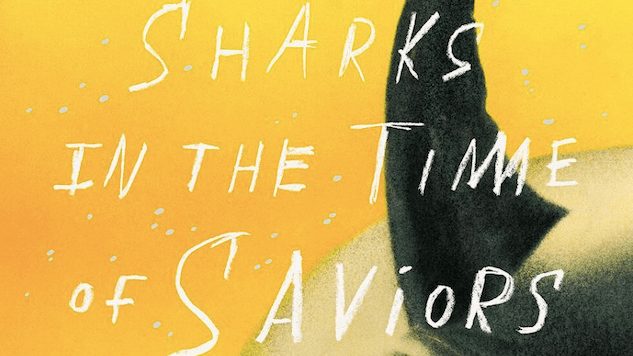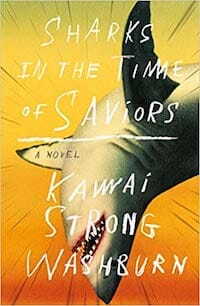Sharks in the Time of Saviors Modernizes Hawaiian Legends

Kawai Strong Washburn’s debut novel reads like it was delivered by a shark from the sea, all blood, salt, cartilage and divinity.
Sharks in the Time of Saviors does not begin literally with this mythological birth, but it blooms from there, extends, suffuses. It’s innervated not by magic but by essence—the spirit of a lost island buried not by the Pacific or a volcano but a civilization that’s never satisfied.
The novel follows the Flores family, whose members span the Big Island to the West Coast. Conceived under the march of ghosts, middle child Nainoa is bestowed with the breath of the gods after he falls off a boat and is rescued by a shark. Through him Hawaii runs; through him the sick are healed; through him each family member views themselves like shattered rainbows through his prism.
 Nainoa’s older brother, sick with envy, carves an identity for himself from the asphalt, wood, chain and nylon of the basketball court, rising and striking like a cobra. His younger sister, supremely intelligent in engineering and hula, carves hers from the arcs and oscillations of the world. And his parents, who created Nainoa in a truck bed beneath the moon and salted clouds, see in him a great promise to restore that which was violently rent away.
Nainoa’s older brother, sick with envy, carves an identity for himself from the asphalt, wood, chain and nylon of the basketball court, rising and striking like a cobra. His younger sister, supremely intelligent in engineering and hula, carves hers from the arcs and oscillations of the world. And his parents, who created Nainoa in a truck bed beneath the moon and salted clouds, see in him a great promise to restore that which was violently rent away.
Nainoa is not enough.
No single thing ever is. There is no single font of beauty, of spirituality, of ipseity; it comes from every direction, every place, every second breathe kiss stitch tear blade leaf bug fish dream wish word song creation tongue. It is pulled and pushed, slipped into and out of, cast into blackness like a squid hook.
The novel’s beauty comes from Washburn’s heritage and voice paired with Hawaii’s supernovae idiosyncrasies. And then it ends, flipping its final page before clinging to the reader like cigarette smoke and humidity.
Sharks in the Time of Saviors reminds us that everything falls—slowly and in a million pieces, prodigal dust atomized and welcomed home from whence it came. And in its wake are shadows and a mark—left in words, symbols, icons and a million teeth in rows.
B. David Zarley is a senior staff writer for Freethink and an essayist, book and art critic. His writing has been featured in The Atlantic, The Verge, Jezebel, VICE Sports, Frieze, Hazlitt and numerous other publications. He lives in Chicago.







































